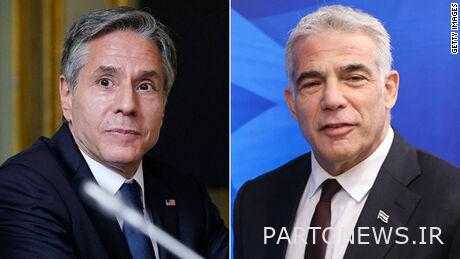US Secretary of State’s consultations with Israel coincide with the Vienna talks

The State Department said in a statement issued Wednesday evening that Blinken had held talks with his Israeli counterpart on Wednesday.
According to a State Department statement, Blinken and his Israeli counterpart discussed a range of regional and global challenges, including the dangers of a possible Russian invasion of Ukraine.
The State Department statement claimed that the two sides also discussed the challenges posed by Iran.
According to the statement, Blinken stressed the Biden government’s strong commitment to the security of the Zionist regime.
According to IRNA, Al-Monitor news-analytical site wrote in a report that Israel’s assessment and position towards the Vienna talks has changed dramatically. Some Israeli media outlets have also openly reported a split in the positions of the regime’s officials regarding the talks between Iran and the P4 + 1 group.
“Most Israeli analysts have so far believed that the prospect of an agreement between Iran and the P5 + 1 has been weak,” the article said, according to IRNA on Wednesday.
They thought that the two sides would not be able to overcome the differences and reach a deadlock, or there was an option that the Zionist regime was not very interested in, and that was the continuation of futile negotiations for several months. But recently this assessment has changed. Israeli Foreign Minister Yair Lapid was the first to point to the change, when he acknowledged that, according to Israeli assessments, world powers were apparently moving toward a return to a nuclear deal, or at least an interim agreement that would lead to that goal. .
The Times of Israel also wrote in a report that there was a rift in the positions of Tel Aviv officials regarding the Vienna talks: Reports indicate that Aharon Haliva, the head of Israel’s military intelligence, says that reviving the Iran nuclear deal is better than failing the talks.
Zionist officials have not stopped fighting for a moment to obstruct the Vienna talks, and Prime Minister Naftali Bennett has repeatedly called for an immediate halt to the talks and even made a hollow claim to influence the atmosphere. Military options have turned to Iran. But Aharon Haliva, Israel’s head of military intelligence, who is well aware of the irreparable consequences of any military error against Iran or in the region, given his experience in the military-security field, believes that it would be better to revive Burjam.
The eighth round of Vienna talks began on December 27th. The talks continued with bilateral and multilateral meetings between the delegations participating in the talks, and Ali Bagheri Keni, Iran’s chief negotiator, met separately with Enrique Mora, chief negotiators of Russia and China, as well as representatives of the three European countries.
Bagheri says the key to the success of the Vienna talks is to reach an agreement on the effective lifting of sanctions against Iran. He stated that the more serious the other side is ready to lift the sanctions and the more serious the will is to accept the mechanisms considered by the Islamic Republic of Iran in lifting the sanctions, especially in the two issues of verification and guarantee in the shortest time we can reach an agreement. do.
Negotiations will continue in the coming days at various levels and formats. Negotiations continue even on Thursday, which is a public holiday in Austria due to a Christian holiday, and it is rumored that the vast majority of delegations are determined to reach an agreement.
.

